How To Treat Tap Water for Hydroponics
Ensuring your hydroponic system thrives starts with understanding how to treat tap water for hydroponics, a crucial step for maintaining optimal plant health and growth.
Tap water, often used in hydroponic systems, can contain chlorine, chloramines, and other dissolved minerals that may harm plants or disrupt nutrient uptake.
This article will guide you through the essential methods to purify and prepare your tap water, ensuring it becomes the perfect foundation for your hydroponic garden.
From filtering out impurities to adjusting pH levels, we'll cover the best practices and tips for creating a safe and nourishing environment for your plants.
What is Tap Water?
Tap water comes from lakes, rivers, or underground sources. It flows through pipes to homes and farms. This water may have minerals like calcium and magnesium or chemicals like chlorine added by treatment plants.
They add these to make the water safe for drinking. But when used in hydroponics, tap water's extra stuff can cause problems for plants.
Gardeners and farmers take note: The quality of tap water varies from place to place. Some water is 'hard,' with lots of dissolved minerals that could change your nutrient solution's balance. Knowing what's in your tap water is key before using it in hydroponic systems.
Components in Tap Water That Affect Hydroponics
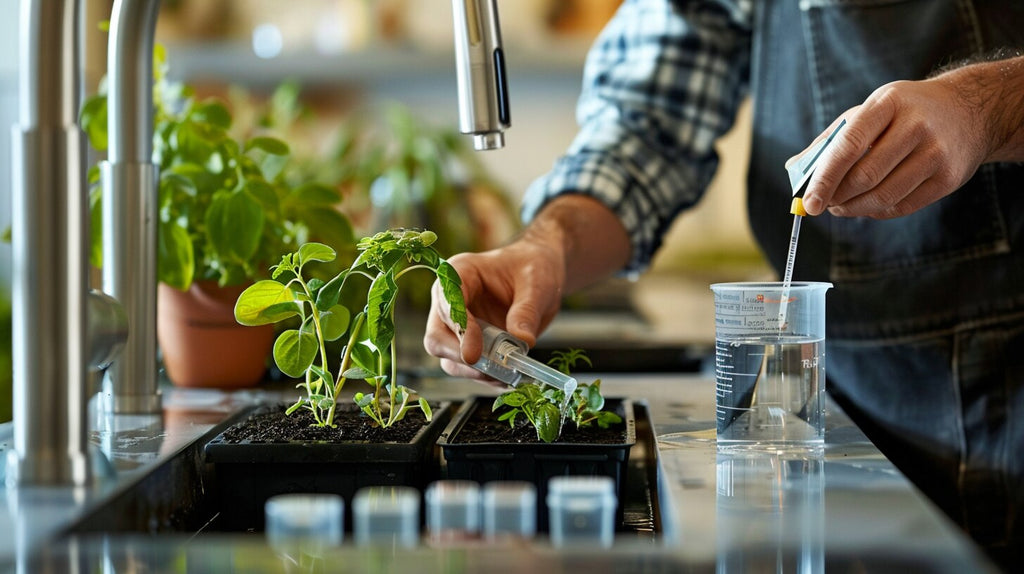
Tap water comes straight from your faucet and seems clean, but it can contain things that affect plants in hydroponic systems. It's important to know what these components are so you can treat the water properly.
- Chlorine: This is added to water by suppliers to kill germs. But it's toxic to hydroponic plants and can damage their growth.
- Chloramine: Unlike chlorine, chloramine lasts longer in water. It can also harm your plants if you don't remove it before use.
- Calcium and Magnesium: These minerals make water "hard." They change the pH level and nutrient balance in your system, which isn't good for your plants.
- Heavy Metals: Elements like lead or copper can be in tap water. They build up in plants over time and may become toxic.
- PPM (Parts Per Million): This measures all the stuff dissolved in your water. High PPM means lots of minerals present, which might not match your plant's needs.
- Organic Material: Bits of leaves or other natural things sometimes end up in tap water. These can rot and ruin the quality of the water for hydroponics.
- PH Levels: Water with a pH that is too high or too low affects how plants take up hydroponic nutrients. You want a neutral pH for most hydroponic systems.
How Tap Water is Treated
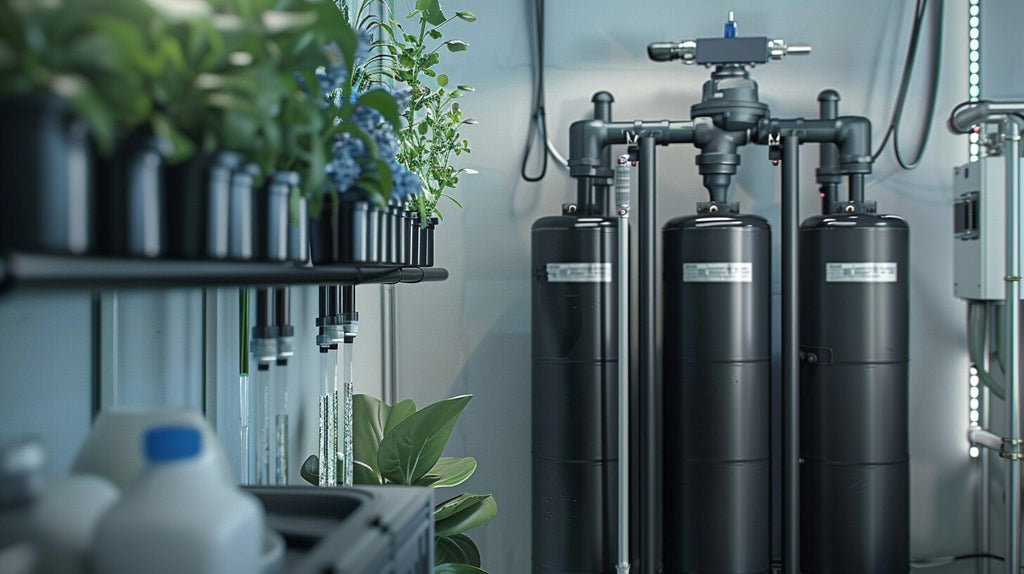
Water suppliers treat tap water through a process of flocculation and sedimentation, followed by filtration and disinfection. This ensures that the water is safe for consumption but may still contain components that can affect hydroponic systems.
Flocculation and Sedimentation
In water treatment plants, chemicals like aluminium sulphate are added to tap water. These cause small particles to clump together in a process called flocculation. Once they stick together, the bigger clumps become heavy and settle at the bottom of a tank during sedimentation.
This step helps clear out impurities before the water gets filtered and disinfected. Clean water then moves on for further purification, while solids stay behind in the sedimentation tank.
Gardeners and farmers need to understand this because it affects how they treat their hydroponic systems' tap water.
Filtration and Disinfection
Filtration removes dirt and other particles from tap water. It uses sand, gravel, and charcoal to catch these tiny bits. This step makes the water clearer but doesn't kill germs. That's where disinfection comes in.
To make sure our water is safe from bacteria like cholera and typhoid, we use methods such as chlorination or ultraviolet (UV) rays.
Chlorine atoms attack harmful substances in the water to destroy them. Sometimes, cities also use chloramines—a mix of chlorine and ammonia—as a disinfectant. These chemicals protect us from diseases but can hurt our plants if they're too strong.
Gardeners should know that filtering out these chemicals is important before using tap water in hydroponics systems.
The Impact of Tap Water on Hydroponics
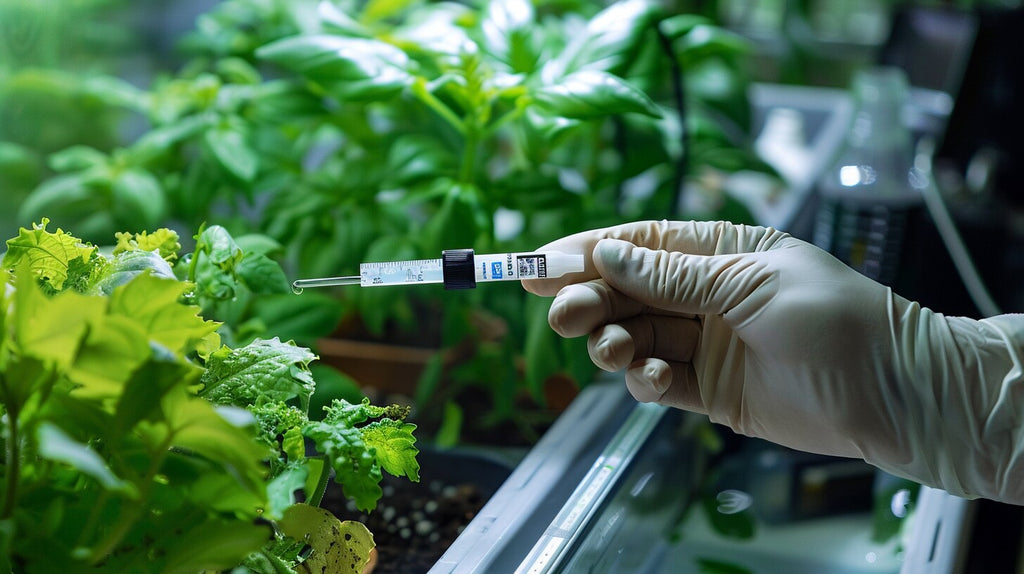
Tap water can contain dissolved minerals that affect the pH and nutrient levels in hydroponic systems, leading to potential problems for plant growth. Hard water, in particular, can create challenges for hydroponic plants due to its high calcium and magnesium content.
Dissolved Minerals (Hard and Soft Water)
Tap water often contains dissolved minerals, such as calcium and magnesium, which determine its hardness. High levels of these minerals can negatively affect the nutrient balance in hydroponic systems.
Hard water with a high PPM (parts per million) can lead to issues like nutrient lockout, hindering plant growth and health.
Soft water, on the other hand, has fewer dissolved minerals and a lower PPM level. It is generally more suitable for hydroponics as it reduces the risk of nutrient imbalances that can stunt plant growth.
Why Hard Water is Bad for Hydroponic Plants
Hard water, rich in mineral ions like calcium and magnesium, can negatively impact hydroponic plants. The excess minerals in hard water can disrupt the pH balance of the nutrient solution, affecting the plant's ability to absorb essential nutrients. This imbalance can lead to deficiencies or toxicities in micronutrients crucial for plant growth.
Furthermore, the buildup of mineral deposits from hard water can clog irrigation systems and block root access to oxygen and nutrients. This impedes plant growth and may lead to stunted development or even crop failure in hydroponic garden.
The Role of Chelates in Hydroponics
Chelates in hydroponics help plants absorb nutrients. EDTA and humic acid are common chelates used. They prevent reactive molecules from interfering with nutrient absorption, promoting healthy plant growth. Chelates ensure the even distribution of nutrients for thriving plants in a hydroponic system.
Chelates aid nutrient absorption in hydroponics. EDTA and humic acid prevent interference to promote healthy plant growth. Even nutrient distribution is crucial for thriving plants within a hydroponic system; chelates play a key role in ensuring this outcome.
Read More: How Ethanol Affects Grow Plants in Hydroponics
Treating Tap Water for Hydroponics
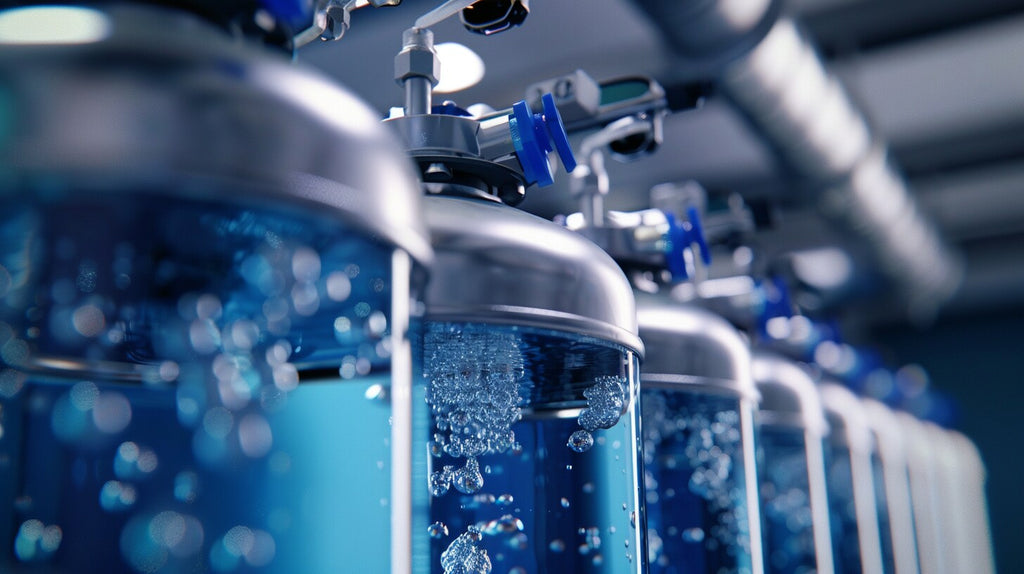
To ensure the best results for your hydroponic plants, it's important to treat tap water properly. This includes removing chlorine, handling chloramine, and dealing with high PPM hard water to provide the best growing environment for your plants.
How to Remove Chlorine
To remove chlorine from tap water for hydroponics, follow these steps:
- Utilize sunlight: Leave tap water in an open container in direct sunlight for 24-48 hours to allow the chlorine to evaporate.
- Activated carbon filters: Pass the tap water through activated carbon filters to effectively remove chlorine and other impurities.
- Campden tablets: Add Campden tablets to the tap water as per the manufacturer's instructions, allowing them to neutralize the chlorine.
- Use a water filter: Employ a high-quality water filter designed specifically to remove chlorine and other contaminants from tap water.
- Combining methods: Combine two or more of these methods for optimal removal of chlorine from tap water before using it in hydroponic systems.
How to Handle Chloramine
Chloramine in tap water can harm hydroponic plants. Here's how to handle it:
- Use a water dechlorinator specifically designed to neutralize chloramine.
- Consider using a carbon filter to remove chloramine from the tap water used in the hydroponic system.
- If possible, let the water sit for 24 hours before using it to allow the chloramine to dissipate naturally.
Dealing with High PPM Hard Water
- High PPM hard water may lead to pH imbalances in hydroponic systems, affecting plant nutrient uptake.
- Use a reverse osmosis water filter to reduce mineral content and bring PPM levels down.
- Consider diluting the hard tap water with distilled water to lower the mineral concentration.
- Implement regular monitoring of pH and nutrient levels to ensure they remain within optimal ranges for plant growth.
- Utilize chelates to bind excessive minerals and prevent them from interfering with nutrient availability.
Alternatives to Tap Water for Hydroponics
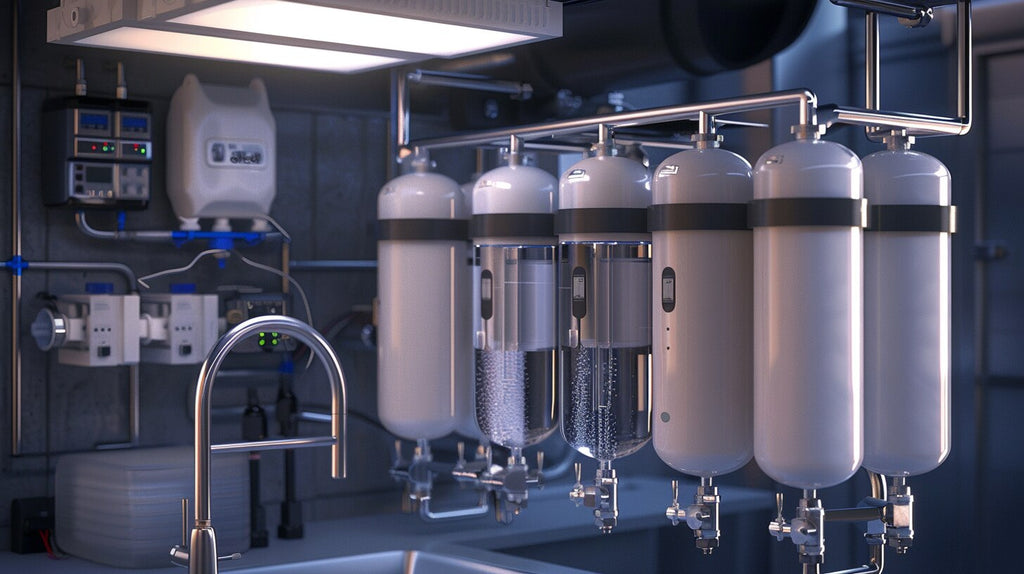
Distilled Water, Reverse Osmosis Water, and Filtered Water are all viable alternatives to tap water for hydroponics. To learn more about these options and how to treat tap water for hydroponics, keep reading our blog!
Distilled Water
Distilled water is perfect for hydroponic systems as it's free from contaminants and minerals, providing an ideal environment for plant growth. It lacks chlorine and chloramines, which can harm plants in hydroponics.
Without minerals, distilled water allows precise control over nutrient content in hydroponic solutions, ensuring optimal plant health.
Reverse Osmosis Water
Transitioning from the topic of Distilled Water, another effective method for treating tap water in hydroponic systems is Reverse Osmosis systems. This process removes up to 99% of dissolved minerals and chemicals from tap water, making it an ideal solution for maintaining proper pH and nutrient levels in a hydroponic system.
With Reverse Osmosis, gardeners and farmers can ensure a consistent and clean water source that is free from chlorine and other harmful chemicals found in tap water. This method is particularly beneficial for dealing with high PPM levels in tap water, providing an efficient way to create the purest water possible for hydroponic plants while eliminating toxins that may impact plant health.
Reverse Osmosis delivers reliable results by effectively removing chlorine, dissolved minerals, and harmful chemicals from tap water. It stands as the most dependable method for ensuring a consistent and clean water supply essential for healthy hydroponic plants' growth and productivity.
Filtered Water
To transition from reverse osmosis water to filtered water, gardeners and farmers can explore using filtered water as an alternative for hydroponic systems. Filtered water can help remove impurities like chlorine, sediments, and other contaminants present in tap water that may affect plant growth.
Investing in a quality filtration system or using commercially available filtered water can ensure that the hydroponic plants receive clean and balanced water without any harmful substances.
This approach allows growers to provide their plants with the best possible growing environment while avoiding the potential negative impacts of untreated tap water.
Ensuring access to clean and balanced water is vital for successful hydroponics, making filtered water a valuable consideration for gardeners aiming to optimize their cultivation practices.
Conclusion
In conclusion, treating tap water for hydroponics is essential to ensure healthy plant growth. Solutions like removing chlorine, handling chloramine, and addressing high PPM hard water are crucial steps in this process.
Alternatives such as distilled water or reverse osmosis can offer cleaner options while avoiding the negative impact of tap water on hydroponic systems. Understanding the composition of tap water and implementing appropriate treatment methods can lead to successful hydroponic gardening.
At Canada Grow Supplies, we're committed to providing a diverse selection of high-quality products and ensuring swift deliveries to meet the unique needs of every cultivator, from hobbyist to commercial grower. Browse our blog for professional insights and cutting-edge approaches to hydroponics.
Start a journey of improvement in your hydroponic gardening routine. Get in touch with us today for top-quality hydroponic nutrients and exceptional service!
FAQs
Why do I need to treat tap water for hydroponics?
You need to treat tap water for hydroponics because pure water without chlorine, salts, or other harmful substances helps your plants grow better.
What is ppm and why is it important in hydroponics?
PPM stands for "parts per million" and measures how much stuff like minerals or chemicals is in your water. It's important because too much can hurt your plants.
Can I use any water filter for my hydroponic system?
You should use a reverse osmosis filter for your hydroponic system because it takes out lots of bad things from the water, making it safe for plants.
Does hard or soft water matter in hydroponics?
Yes, the hardness of water matters because hard water has more calcium carbonate that can build up and harm your system, while soft water is usually better for plants.
How does distillation work in treating tap water?
Distillation works by boiling the dirty or chlorinated domestic waters into steam and then cooling them back into clean drops called condensation that leave dirt behind.
Is UV treatment good for getting rid of germs in my hydroponic water?
Yes! UV light kills single-celled organisms like germs without adding poisons to the environment when you're purifying your source waters.








